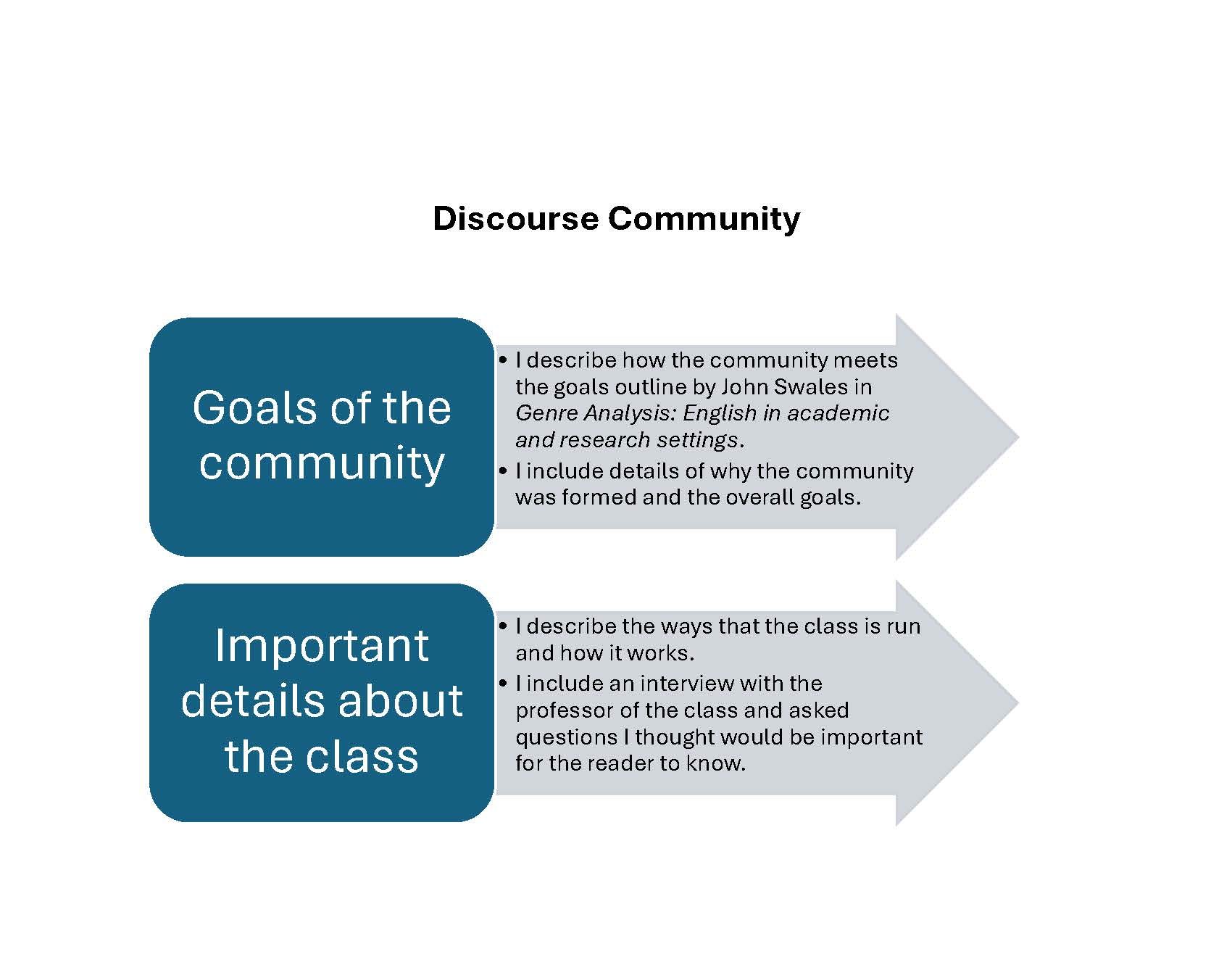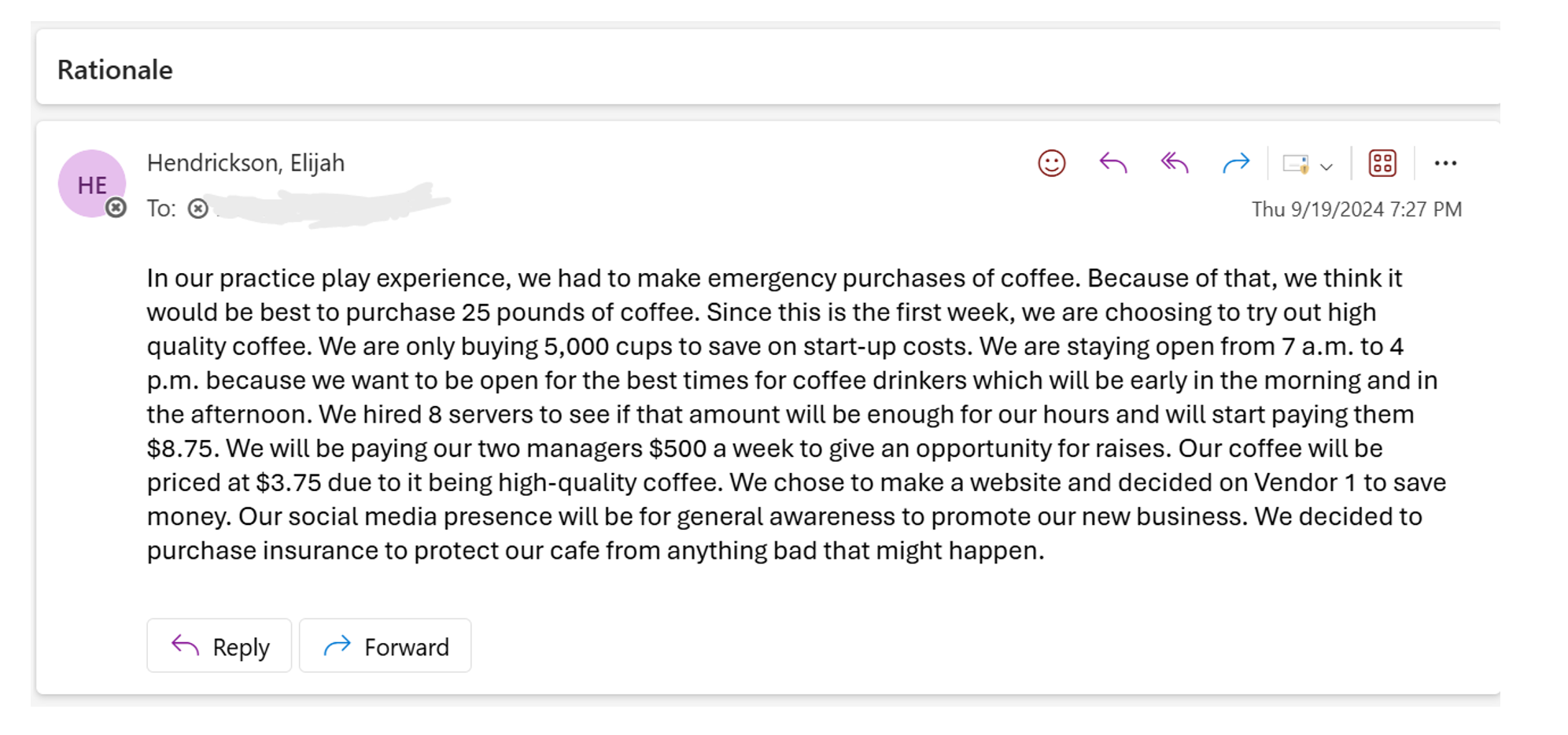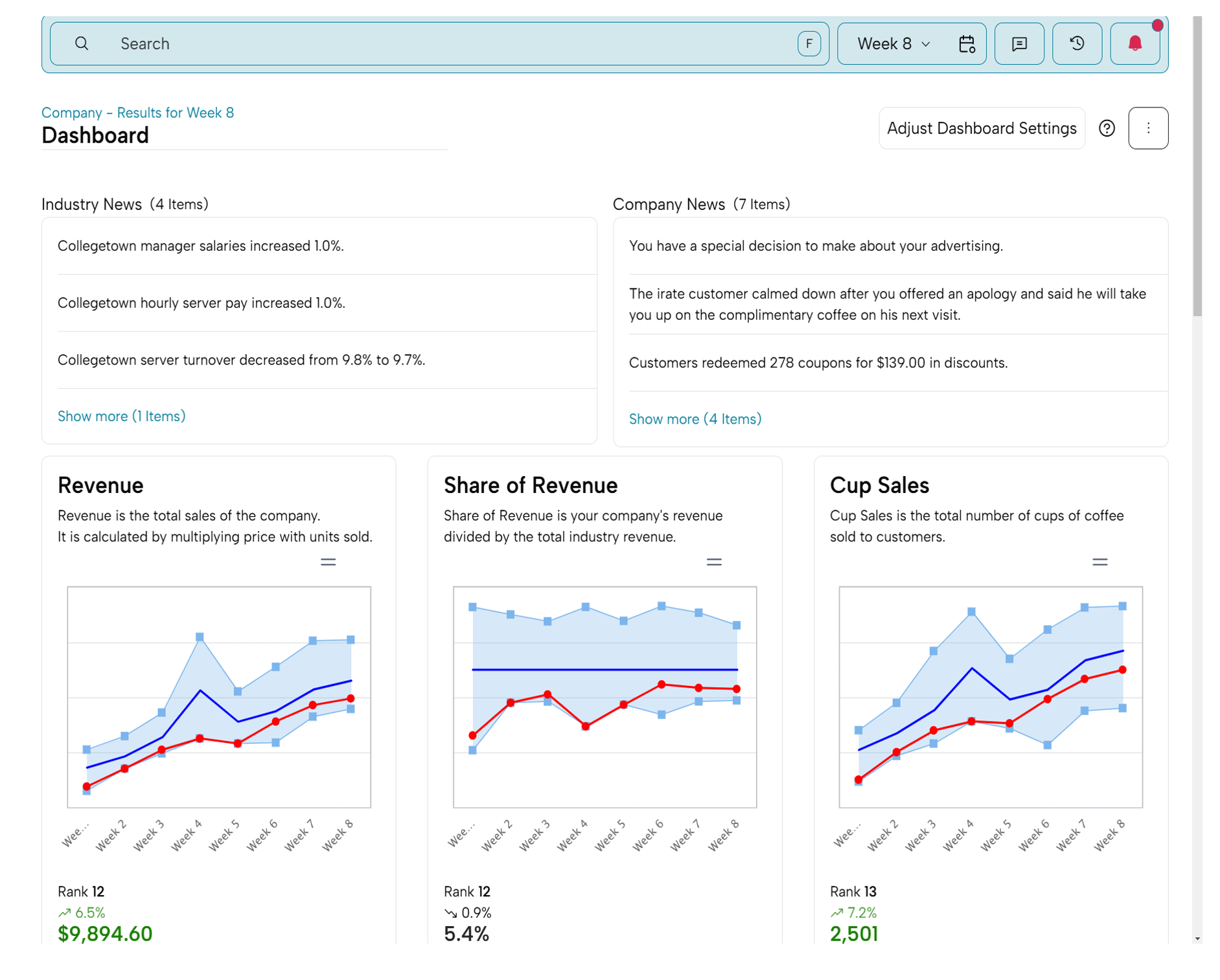21 Elijah Hendrickson – Discourse Community: Principles of Business Administration Simulation Group
Elijah Hendrickson is a Freshman from Losantville, IN, and he is majoring in Accounting. Elijah graduated from Randolph Southern JR SR High School in May of 2024. This work was prepared for Sharon A. Lucero’s English 131, who states, “It was an exceptional report and original.”
Discourse Community: Principles of Business Administration Simulation Group

According to John Swales (1990), “A discourse community is a group of people communicating with one another with common goals and interests.” The discourse community I have chosen to explore in this assignment is my Principles of Business Administration simulation group, the Latte Lounge. This is a group that I am a part of at Indiana University East in Richmond, Indiana. My focus for this discourse community is to display how the members of the group communicate with each other to accomplish our goals.
To begin with, John Swales (1990) speaks of six defining characteristics that I am applying to my own discourse community (p. 220). A discourse community:
- has a broadly agreed set of common public goals (shared and clear purpose) My community’s goals are to succeed in running a simulated coffee shop and to do as good if not better than other students in the class running their own simulated coffee shops. This goal applies to every group in the class, creating a friendly competition to be the best cafe in the class. Another goal of the class is to be able to say we made a profit. At the beginning of the simulation, we were given a $25,000 loan to run the shop. This means that one of our goals is to be able to pay back that loan and be able to say we made money in the simulation. If we are able to achieve these goals, we will have succeeded in running a virtual small business and will have a better grasp on the business world. While there is not a large amount of competition between groups other than in a friendly manner, our professor explained to us that whichever group does the best will earn the most extra credit.
- has mechanisms of intercommunication among its members (keeping in touch) Since we are a group of individual students, we all have schedules that do not always allow us to meet up in person. This means that we cannot discuss the group’s goals face to face, decide what should be done for the simulation, or decide who should be doing what on the group assignments. We understood this when the simulation began, we needed a way to communicate as a group. That is why when our group formed, we shared contact information and started a group chat. This group chat is used with the Messages app we all have installed on our phones. We use this group chat to discuss what to do in the simulation for that week if more than one of the three of us cannot make it to class on that particular day, share the decisions made in the simulation for the group leader to complete part of the work, to discuss the group assignments for the week, or every now and then to double check that class will be in session on a day. However, we do meet in class every Thursday to participate in the simulation if we are all present. We have also used Outlook to send emails that detail the decisions made in the simulation in the past. An example of which is below.

- uses its participatory mechanisms to provide feedback (feedback up the chain and down) As a group we are relatively unexperienced in the decisions that need to be made or how to complete assignments. We often have to ask each other for help and our team leader makes sure that we are doing things correctly. All feedback is done in an overall positive manner, making sure that we know what to do and when. The group leader will tell the other two of us when she needs the assignment done and we have all been trying to follow a schedule and be consistent on getting our work done on time. In the past, we have had to ask each other how to answer the questions correctly on one of the group assignments because we do not know how to answer. We have also had to ask each other our opinions on how the simulation should be done and our professor will help us if we ask for it and he has spoken directly to us to guide us in what we are doing. Our professor will also give us feedback on our individual performances with the Student Engagement Roster that we can access through One.IU. Below is an example of feedback on my performance on the Student Engagement Roster.

- utilizes and hence possesses one or more genres in the communicative furtherance of its aims (special document types) Every type of community will have different forms of documents in regard to how the work is completed. One of our main document types is on the website where the simulation is conducted, which lets us see our weekly performance. This website is the Interpretive site, and it is where a majority of the group work is done and where we can see the results of the other groups. But we also have group assignments every week. These assignments are completed on Microsoft Word, like most assignments for the class. We are also doing a majority of the learning for the class on a series of slides that our professor shows us every class. We can take the lessons on the slides and do our best to apply them to the simulation. Below is an example of the results of our simulation for Week 8.

- has some specific lexis (special vocabulary) With everything, there are words and phrases that might make sense to others but have a different meaning to this group and class. Some special vocabularies are the ways we discuss our progress and what decisions we need to make. An example of this is us discussing being in “the hole”, which means the amount of money we make until we make a profit. This has been the biggest focus of the simulation for weeks because our group was not doing the greatest and we spent those weeks trying to get out of the hole, something we finally managed to do within the last few weeks. Another example is us discussing social media presence. This is a way that we discuss how social media impacts the business and the ways we can use it to increase revenue, like us discussing whether or not to use it at all or if we should use it to market or give deals and coupons. The final example of special vocabulary would be how we use the phrase “Special Decision”. To those in the group and others participating in a simulation, this phrase refers to a unique decision that is not part of the typical ones needed for that week.
- has a threshold level of members with a suitable degree of relevant content and discoursal expertise (mix of experts and novices) As previously stated, all three members of our group are relatively inexperienced in terms of the business. Our professor has the expertise because he understands how to help us and the three of us in the group are all relative novices, since the three of us are freshmen and have not done something like this before. However, within the group there is a leader. At the beginning of the semester, when the simulation started, we all decided to elect a team leader. She oversees making sure that all group assignments are submitted, and she ultimately has the final say on all decisions made in the simulation, even though she does ask for the rest of the group’s input when making these decisions.
For this paper, an interview was conducted with the class professor, Dr. LaCalvince Simpson. This interview was conducted over email for the sake of schedules and the access to the information needed. I decided to interview him because he has the most knowledge in the class as he is the one who teaches us and works directly with us if needed. For the first question, I asked, “How long have you been working in both the business world and teaching in general?” His response to this question was, “Prior to teaching I have worked in the business field for multiple years in advertising, sales, and marketing. However I have been teaching since 2012. I began teaching at a community college, then at HBCU (Historical Black College and University), and lastly at IU East” (L. Simpson, Personal Communication, November 20, 2024). The next question asked was, “In the past, you have discussed how you were making better money at previous jobs. What made you leave those higher paying jobs and start working here at IU East?” This question got the response, “I had a passion for teaching. Sharing the knowledge I have obtained. I have always been interested in teaching and when I was offered the opportunity, I decided to do so” (L. Simpson, Personal Communication, November 20, 2024). The final question I asked him was “What keeps you here at IU East and not anywhere else where you could potentially be making more money?” This final question received the response, “I stay because I enjoy teaching here. I like the students and the community. I have the opportunity to make a big difference in student lives here. Larger schools are great, smaller regional schools also offer the same opportunities or instructors. Maybe more” (L. Simpson, Personal Communication, November 20, 2024). I thanked him for answering these questions and I used them while writing this section of the paper. Dr. Cal’s class is an incredibly useful for someone going into the field of business, and he is incredibly friendly and personable, another reason why I decided to interview him. These responses answered my questions in a satisfactory manner and were helpful in not only writing the paper but in considering how I will proceed in the business world in the future.
In conclusion, I used John Swales’s (1990) “Concept for a Discourse Community” to explain what makes the Principles of Business Administration simulation group, the Latte Lounge, a discourse community and how the Principles of Business Administration simulation group, the Latte Lounge, uses various forms of communication to achieve our goals.
References
Simpson, L. Email and Personal Communication, November 20, 2024
Maddie Bishop, Email, October 19, 2024
Student Engagement Roster, Online, November 18, 2024
Interpretive Simulations, Online, November 14, 2024
Swales, J. (1990). The concept of a discourse community, In Genre Analysis: English in academic and research settings, pp. 21-32, Cambridge UP.
Media Attributions
- Infograph ish – Eli the Nerd_Page_2
- Elijah pic 1
- Elijah pic 2
- Elijah pic 3
